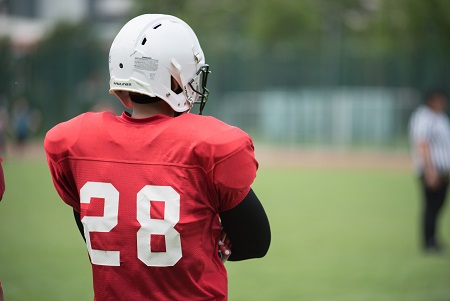Every young athlete dreams of success on the football field, but achieving their goals often means juggling two heavy commitments – school and American Football. This balancing act can present a challenge for many players; luckily there are tips to help maintain peak performance in both areas. Read on to discover how you can ensure that your academic pursuits don’t come at the expense of your athletic ambitions!
First, it is important to create a manageable schedule with realistic expectations set by coaches and parents alike. Knowing when practices occur as well as upcoming game dates can help plan out studies accordingly. Additionally, having dedicated time set aside for studying each day is essential for staying organized and keeping up with assignments.
Second, having access to resources such as teachers or tutors is beneficial for receiving extra guidance if needed. Working together with mentors outside of practice allows players to ask questions about difficult topics to better understand the subject material. Also, having someone who keeps track of progress helps ensure work gets done on time before deadlines approach too quickly.
Finally, scheduling breaks throughout the week gives athletes much-needed opportunities for rest after long days. It also provides valuable time away from football activities so that other interests do not take a backseat during the season. By investing in self-care habits like yoga or meditation students can gain mental clarity without sacrificing their competitive edge on the field.
Time Management Strategies For Student-Athletes
Balancing academics and athletics can seem like a challenge, but thanks to smart strategies such as planning, breaking down tasks into smaller parts, and delegating responsibilities – it is possible for student-athletes to achieve success in both arenas. This section will provide you with tips on how best implement these approaches so that each wins out!
Time management techniques are essential for student-athletes if they wish to excel both academically and athletically. Planning involves mapping out the week of activities and commitments that need to be fulfilled. This includes scheduling practice times around classes or studying for exams during down periods between games. Organizing tasks into smaller parts also helps break complex projects into more manageable chunks with step-by-step instructions on completion timelines. Finally, delegating responsibilities allows other people to assist in completing certain obligations while freeing up additional free time for athletes. Overall, the thoughtful organization is key when balancing academic and athletic pursuits.
Prioritizing Football Training And Practice
Too often, the idea of balancing school and American football is seen as a daunting task for young players. Irony aside, it surely involves a lot of hard work and dedication to manage both pursuits successfully. However, with effective time management strategies, student-athletes can prioritize their football training and practice while still maintaining their academic responsibilities.
One way to ensure that students are getting enough practice during the season is by setting specific goals each day or week before activities begin. For instance, if a high school player must attend two practices per week and one game on Saturday, it might be beneficial for them to develop an individualized plan outlining how they will handle all commitments throughout the week. This includes studying for exams, completing assignments on time, and attending lectures and meetings at college or university when applicable. Additionally, having set times dedicated solely towards practicing football skills such as footwork drills or weight lifting helps keep athletes focused on honing their craft without falling behind academically.
Prioritizing certain tasks also allows student-athletes to stay organized so that any additional free time can be used wisely and efficiently outside of sports and studies. By planning out days ahead of time – including what needs to get done first – athletes can remain proactive rather than reactive when juggling different obligations. Such techniques help young players stay disciplined and motivated even after long hours spent in class or on the field; allowing them to achieve success in both arenas simultaneously.
Dealing With Academic And Social Challenges
Interesting statistics show that the majority of college football players are student-athletes, with approximately 76% of them having academic standing above 3.0 GPA (National Collegiate Athletic Association). With this in mind, young players need to be able to manage their time appropriately between school and football commitments. This third section will discuss strategies on how they can deal with both academic and social challenges while playing American Football with the team’s football uniforms.
Time management is a key factor when balancing school and sports activities. Young players should set realistic goals by breaking down large tasks into smaller manageable chunks as well as setting deadlines for each task along the way. Additionally, they should make sure to prioritize studying over recreational activities to ensure better results in academics. Scheduling study blocks during specific times throughout the day helps keep the focus on studies while dividing other hours among practice, rest, family time etcetera. It also strengthens discipline which is an important quality required from any successful athlete or student alike.
In addition to managing their time efficiently, young players must know how to use resources available at hand such as tutoring services or online classes if needed. Having access to reliable mentors who have experienced similar situations gives fresh perspectives which help find solutions quickly and effectively. Utilizing these resources grants more freedom in terms of gaining knowledge without compromising physical training periods or missing out on team meetings/events due to overloads of schoolwork. Moreover, connecting with fellow teammates facing the same problems can improve mental health significantly since one does not feel alone in his struggles anymore.
Conclusion
Athletic achievement and academic excellence can be achieved simultaneously with the right strategies. Student-athletes must learn how to manage their time, prioritize football training and practice, as well as address any academic or social challenges that come up along the way. Young players need to understand this balance to have a successful experience on both fronts.
In recent years, high school athletes have experienced an increase in average grade point averages (GPAs). According to the National Federation of State High School Associations (NFHS), from 2017 to 2018, there was a .1 increase in GPA among student-athletes. This statistic demonstrates that students can excel at athletics while also succeeding academically if they are equipped with the proper resources and support systems.
Student-athletes can have it all! Through diligent time management, well defined priorities, and leveraging available resources when appropriate; peak performance in both academics and American Football is within reach. There’s no limit to what dedicated hard work combined with smart planning helps you accomplish. Reach for the stars – greatness awaits!








